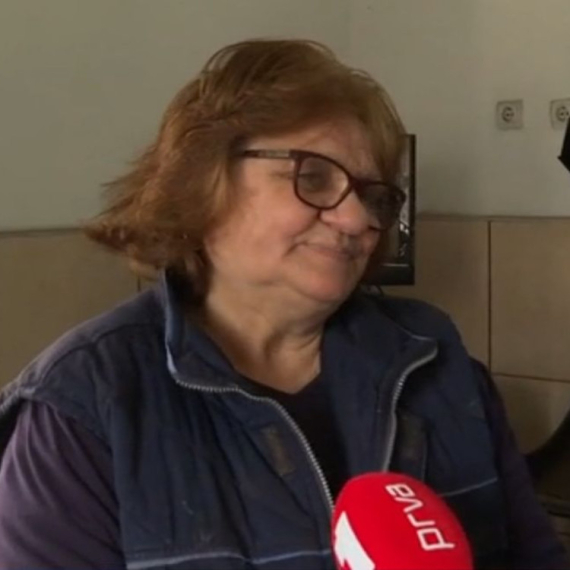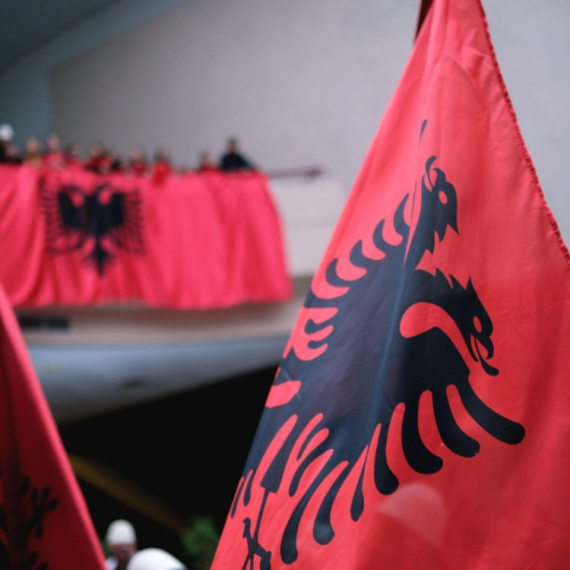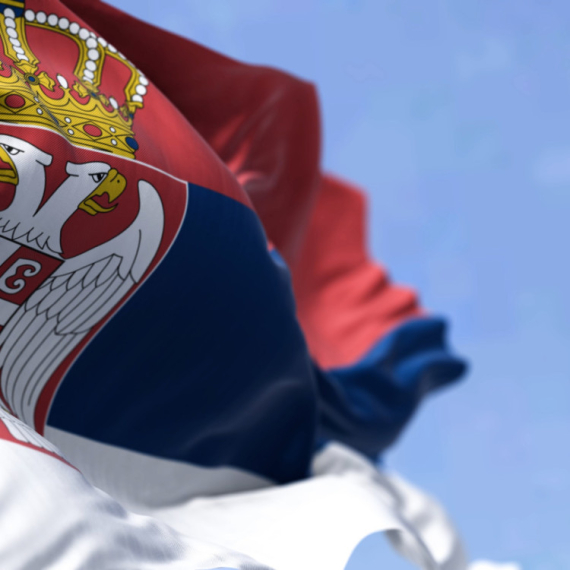Munter: Supervised independence best Kosovo solution
Thursday, 27.09.2007.
18:29

Munter: Supervised independence best Kosovo solution B92: Mr. Ambassador, the first round of direct talks between Kosovo Albanians and the Serbian authorities is due to take place in New York tomorrow. It looks to me that not many of your colleagues, diplomats, are enthusiastic about the possible outcome. Many believe that no major breakthrough will happen. How do you see this, and what do you expect? Munter: The result of the talks really is up to the authorities from Belgrade and Pristina. We are every happy, our European friends are very happy, and our Russian friends are very happy that these talks are taking place. We believe it is important that the two sides, Belgrade and Pristina, have the chance to speak face to face . We support this process because we believe this is the way in which they can come to better understandings. Whether there will be a breakthrough, is up to them. B92: Here in Serbia we are somewhat confused because we do not see what exactly your message is, the message from Washington. You said a couple of days ago in an interview for the daily newspaper Blic that the Ahtisaari plan was one of the options and that the best solution would be the one that came as an agreement reached between the Serbs and Albanians. However, Ms. Condoleezza Rice said something completely different, that America strongly supports the idea of independence. So, what is it actually that you support? Munter: You'll note that what Ms. Condoleezza Rice said was really not so much in opposition to what I said, rather both of us have said that we support the talks and we call on both sides to come to an agreement. An agreement from both sides is really something we all seek and we strongly support the process. If these discussions don’t come to an agreement, our position remains as it has been for many months, that we think that the best way to stability in the Balkans is through the… supervised independence of Kosovo, and the ideas that the Ahtisaari Plan supposed. B92: But you see the problem here is if Albanians have the clear message from Washington that "we support the idea of independence," why would they negotiate? Munter: Well, first, we are encouraging them to negotiate just as our president encouraged president Tadic when they met in New York to negotiate as well. We all know that that is the best solution. We are letting the world know what we think is the best solution for peace in this region, as we have said for a very long time. But, make no mistake, we are telling the Albanians as well that we think it is an excellent idea for them to deal with this issue face to face with Belgrade. And, the reason is because Pristina and Belgrade will have to live with each other no matter what happens in this situation and working things out together is really the best way that they can do that. B92: Our colleagues who are attending the General Assembly meeting say there is a lot of arm-twisting in that building on the East River and that, actually, the American diplomats are advocating independence for Kosovo strongly. Munter: I'm not aware of what arm-twisting is going on there, I'm working in Belgrade where I am trying to give as clear a message as I can and I think that the clear message that I am trying to get across is to reiterate what I said recently that we strongly support the talks between the Serbs and the Kosovars, and we hope the best way for them to come over their differences is to talk face to face. The American position has and remains that if those talks are not successful, we believe that supervised independence is the best way to promote stability in the Balkans. B92: How do you comment on ideas that we saw in the past couple of days that perhaps Kosovo issues should be resolved using the China-Taiwan recipe or … Hong Kong – China. These are all new ideas that we haven't heard before. Munter: These are also ideas that I hadn't heard before, but I do think that what Mr. Ischinger has done a very good job of doing, is leading both of these sides to a position where they can speak to one another and they consider any kind of option. We hope they will consider any and all kinds of options, so that they come to an agreement that both sides will agree to, so that something that comes out of this will be acceptable to Belgrade and Pristina. B92: You arrived here a couple of weeks ago, but I am sure that you are aware that the Serbian government is very determined to strongly respond to every country that decides to recognize independence of Kosovo unilaterally. How do you think your life would look like here if that happens? Do you expect a major deterioration in the relationship between the two countries? Munter: Its often said about Americans that we're optimists, and I am an optimist. I don't want to prejudge what happens after December 10. We want to give these negotiations time, we want to give them a chance, I have a lot of faith in Mr. Ischinger, and with his colleagues from Russia and the United States, my colleague, Frank Wisner. And so, I'm still hopeful that we'll come to a situation where either there's an agreement there, or, if there's a consensus afterwards that we get through this process, and that it's not something that affects the larger issues that we in the United States Embassy think are important: our relationship with you that’s built on economics, that's built on exchanges, that's built on cultural ties that we think in the long run is going to be as good for the next 125 years as it has been for the last 125 years. Ambassador Cameron Munter (B92) The newly appointed U.S. ambassador to Serbia, Cameron Munter, gave an interview to B92 on Friday. "I do think that what Mr. Ischinger has done a very good job leading both sides to a position where they can speak to one another and they consider any kind of option. We hope they will consider any and all kinds of options, so that they come to an agreement."
Munter: Supervised independence best Kosovo solution
B92: Mr. Ambassador, the first round of direct talks between Kosovo Albanians and the Serbian authorities is due to take place in New York tomorrow. It looks to me that not many of your colleagues, diplomats, are enthusiastic about the possible outcome. Many believe that no major breakthrough will happen. How do you see this, and what do you expect?Munter: The result of the talks really is up to the authorities from Belgrade and Priština. We are every happy, our European friends are very happy, and our Russian friends are very happy that these talks are taking place. We believe it is important that the two sides, Belgrade and Priština, have the chance to speak face to face . We support this process because we believe this is the way in which they can come to better understandings. Whether there will be a breakthrough, is up to them.
B92: Here in Serbia we are somewhat confused because we do not see what exactly your message is, the message from Washington. You said a couple of days ago in an interview for the daily newspaper Blic that the Ahtisaari plan was one of the options and that the best solution would be the one that came as an agreement reached between the Serbs and Albanians. However, Ms. Condoleezza Rice said something completely different, that America strongly supports the idea of independence. So, what is it actually that you support?
Munter: You'll note that what Ms. Condoleezza Rice said was really not so much in opposition to what I said, rather both of us have said that we support the talks and we call on both sides to come to an agreement. An agreement from both sides is really something we all seek and we strongly support the process.
If these discussions don’t come to an agreement, our position remains as it has been for many months, that we think that the best way to stability in the Balkans is through the… supervised independence of Kosovo, and the ideas that the Ahtisaari Plan supposed.
B92: But you see the problem here is if Albanians have the clear message from Washington that "we support the idea of independence," why would they negotiate?
Munter: Well, first, we are encouraging them to negotiate just as our president encouraged president Tadić when they met in New York to negotiate as well. We all know that that is the best solution. We are letting the world know what we think is the best solution for peace in this region, as we have said for a very long time.
But, make no mistake, we are telling the Albanians as well that we think it is an excellent idea for them to deal with this issue face to face with Belgrade. And, the reason is because Priština and Belgrade will have to live with each other no matter what happens in this situation and working things out together is really the best way that they can do that.
B92: Our colleagues who are attending the General Assembly meeting say there is a lot of arm-twisting in that building on the East River and that, actually, the American diplomats are advocating independence for Kosovo strongly.
Munter: I'm not aware of what arm-twisting is going on there, I'm working in Belgrade where I am trying to give as clear a message as I can and I think that the clear message that I am trying to get across is to reiterate what I said recently that we strongly support the talks between the Serbs and the Kosovars, and we hope the best way for them to come over their differences is to talk face to face. The American position has and remains that if those talks are not successful, we believe that supervised independence is the best way to promote stability in the Balkans.
B92: How do you comment on ideas that we saw in the past couple of days that perhaps Kosovo issues should be resolved using the China-Taiwan recipe or … Hong Kong – China. These are all new ideas that we haven't heard before.
Munter: These are also ideas that I hadn't heard before, but I do think that what Mr. Ischinger has done a very good job of doing, is leading both of these sides to a position where they can speak to one another and they consider any kind of option. We hope they will consider any and all kinds of options, so that they come to an agreement that both sides will agree to, so that something that comes out of this will be acceptable to Belgrade and Priština.
B92: You arrived here a couple of weeks ago, but I am sure that you are aware that the Serbian government is very determined to strongly respond to every country that decides to recognize independence of Kosovo unilaterally. How do you think your life would look like here if that happens? Do you expect a major deterioration in the relationship between the two countries?
Munter: Its often said about Americans that we're optimists, and I am an optimist. I don't want to prejudge what happens after December 10. We want to give these negotiations time, we want to give them a chance, I have a lot of faith in Mr. Ischinger, and with his colleagues from Russia and the United States, my colleague, Frank Wisner.
And so, I'm still hopeful that we'll come to a situation where either there's an agreement there, or, if there's a consensus afterwards that we get through this process, and that it's not something that affects the larger issues that we in the United States Embassy think are important: our relationship with you that’s built on economics, that's built on exchanges, that's built on cultural ties that we think in the long run is going to be as good for the next 125 years as it has been for the last 125 years.
















































Komentari 13
Pogledaj komentare